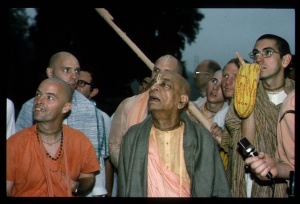SB 9.14.29: Difference between revisions
m (1 revision(s)) |
(Vanibot #0054 edit - transform synonyms into clickable links, which search similar occurrences) |
||
| (One intermediate revision by one other user not shown) | |||
| Line 1: | Line 1: | ||
{{info | {{info | ||
|speaker= | |speaker=Urvaśī | ||
|listener=King | |listener=King Purūravā | ||
}} | }} | ||
[[Category:Srimad-Bhagavatam - Canto 09 Chapter 14]] | |||
[[Category:Bhagavatam Verses Spoken by Urvasi - Vanisource|091429]] | |||
<div style="float:left">'''[[Srimad-Bhagavatam]] - [[SB 9|Ninth Canto]] - [[SB 9.14: King Pururava Enchanted by Urvasi|Chapter 14: King Purūravā Enchanted by Urvaśī]]'''</div> | |||
<div style="float:right">[[File:Go-previous.png|link=SB 9.14.28]] '''[[SB 9.14.28]] - [[SB 9.14.30]]''' [[File:Go-next.png|link=SB 9.14.30]]</div> | |||
{{RandomImage}} | |||
==== TEXT 29 ==== | ==== TEXT 29 ==== | ||
<div | <div class="verse"> | ||
yad-viśrambhād ahaṁ naṣṭā | :yad-viśrambhād ahaṁ naṣṭā | ||
hṛtāpatyā ca dasyubhiḥ | :hṛtāpatyā ca dasyubhiḥ | ||
yaḥ śete niśi santrasto | :yaḥ śete niśi santrasto | ||
yathā nārī divā pumān | :yathā nārī divā pumān | ||
</div> | </div> | ||
| Line 17: | Line 22: | ||
==== SYNONYMS ==== | ==== SYNONYMS ==== | ||
<div | <div class="synonyms"> | ||
yat- | ''[//vanipedia.org/wiki/Special:VaniSearch?s=yat&tab=syno_o&ds=1 yat]-[//vanipedia.org/wiki/Special:VaniSearch?s=viśrambhāt&tab=syno_o&ds=1 viśrambhāt]'' — because of depending upon whom; ''[//vanipedia.org/wiki/Special:VaniSearch?s=aham&tab=syno_o&ds=1 aham]'' — I (am); ''[//vanipedia.org/wiki/Special:VaniSearch?s=naṣṭā&tab=syno_o&ds=1 naṣṭā]'' — lost; ''[//vanipedia.org/wiki/Special:VaniSearch?s=hṛta&tab=syno_o&ds=1 hṛta]-[//vanipedia.org/wiki/Special:VaniSearch?s=apatyā&tab=syno_o&ds=1 apatyā]'' — bereft of my two sons, the lambs; ''[//vanipedia.org/wiki/Special:VaniSearch?s=ca&tab=syno_o&ds=1 ca]'' — also; ''[//vanipedia.org/wiki/Special:VaniSearch?s=dasyubhiḥ&tab=syno_o&ds=1 dasyubhiḥ]'' — by the plunderers; ''[//vanipedia.org/wiki/Special:VaniSearch?s=yaḥ&tab=syno_o&ds=1 yaḥ]'' — he who (my so-called husband); ''[//vanipedia.org/wiki/Special:VaniSearch?s=śete&tab=syno_o&ds=1 śete]'' — lies down; ''[//vanipedia.org/wiki/Special:VaniSearch?s=niśi&tab=syno_o&ds=1 niśi]'' — at night; ''[//vanipedia.org/wiki/Special:VaniSearch?s=santrastaḥ&tab=syno_o&ds=1 santrastaḥ]'' — being afraid; ''[//vanipedia.org/wiki/Special:VaniSearch?s=yathā&tab=syno_o&ds=1 yathā]'' — as; ''[//vanipedia.org/wiki/Special:VaniSearch?s=nārī&tab=syno_o&ds=1 nārī]'' — a woman; ''[//vanipedia.org/wiki/Special:VaniSearch?s=divā&tab=syno_o&ds=1 divā]'' — during the daytime; ''[//vanipedia.org/wiki/Special:VaniSearch?s=pumān&tab=syno_o&ds=1 pumān]'' — male. | ||
</div> | </div> | ||
| Line 24: | Line 29: | ||
==== TRANSLATION ==== | ==== TRANSLATION ==== | ||
<div | <div class="translation"> | ||
"Because I depended on him, the plunderers have deprived me of my two sons the lambs, and therefore I am now lost. My husband lies down at night in fear, exactly like a woman, although he appears to be a man during the day." | "Because I depended on him, the plunderers have deprived me of my two sons the lambs, and therefore I am now lost. My husband lies down at night in fear, exactly like a woman, although he appears to be a man during the day." | ||
</div> | </div> | ||
__NOTOC__ | |||
<div style="float:right; clear:both;">[[File:Go-previous.png|link=SB 9.14.28]] '''[[SB 9.14.28]] - [[SB 9.14.30]]''' [[File:Go-next.png|link=SB 9.14.30]]</div> | |||
__NOTOC__ | |||
__NOEDITSECTION__ | |||
Latest revision as of 23:43, 18 February 2024

His Divine Grace
A.C. Bhaktivedanta Swami Prabhupada
A.C. Bhaktivedanta Swami Prabhupada
TEXT 29
- yad-viśrambhād ahaṁ naṣṭā
- hṛtāpatyā ca dasyubhiḥ
- yaḥ śete niśi santrasto
- yathā nārī divā pumān
SYNONYMS
yat-viśrambhāt — because of depending upon whom; aham — I (am); naṣṭā — lost; hṛta-apatyā — bereft of my two sons, the lambs; ca — also; dasyubhiḥ — by the plunderers; yaḥ — he who (my so-called husband); śete — lies down; niśi — at night; santrastaḥ — being afraid; yathā — as; nārī — a woman; divā — during the daytime; pumān — male.
TRANSLATION
"Because I depended on him, the plunderers have deprived me of my two sons the lambs, and therefore I am now lost. My husband lies down at night in fear, exactly like a woman, although he appears to be a man during the day."